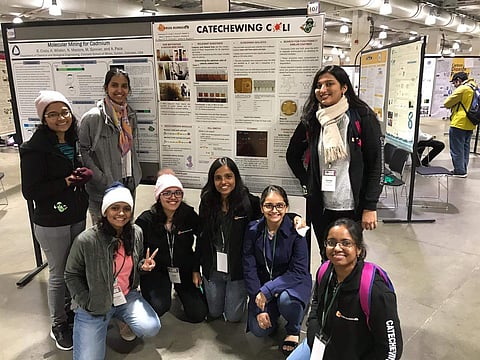

The virtuousness of the famous paan was praised enthusiastically by an actor in a hit song from a 1978 Bollywood blockbuster. At the risk of being redundant, it Khaike Paan Banaras Wala from Amitabh Bachchan's Don. It is still relevant after 40 years. What is at stake is the various railway stations across the country, which are facing a major problem with a social menace — betel nut chewing and spitting on the walls of the adorable railway stations. As disgusting as those paan stains look on the walls, it takes a huge amount of effort to scrub them off.
However, now the cleaning process might get easier, cost-effective and more eco-friendly, thanks to eight female students at the Ramnarain Ruia College in Mumbai. The all-girl team of eight — Aishwarya Rajurkar, Anjali Vaidya, Nishtha Pange, Komal Parab, Maithili Savant, Mitali Patil, Sanika Ambre, and Shrutika Sawant were on a pursuit to find a simpler method to clean the paan stains from the railway stations of Mumbai. These third-year Microbiology students have engineered an organism that can degrade the paan stains by producing a mixture of enzymes which will convert the stains into a harmless product. The method of removal involves using microbes and enzymes that naturally process the red pigment of paan products into a ‘colourless and harmless product’.
The students further plan to create a gel with the help of these enzymes that can be pasted over the stains in order to dissolve them, which can then be scrubbed off with far less water than used currently. "Just for the competition, we had genetically modified a microorganism, bacteria to be specific so that it produces specific enzymes which could degrade or remove the paan stains. But as the release of Genetically Modified Organisms (GMO) in the environment is a safety hazard and has various government regulations and keeping in mind the suggestions given from various industries, we decided to move it to an ‘enzyme-based application system’ which will remove these stains in an effective way. We need to work on extracting and purifying the enzymes and then to module it in gel-based or spray system, it will take at least six months to a year to complete our work and get the product ready and commercially usable," says Aishwarya.
The team from Ruia College became the only undergraduate college among 300 entries to receive an award at the Genetically Engineered Machines (iGem) competition held by MIT, Boston. The MIT at Boston organises the International Genetically Engineered Machines research competition every year. They were given a special award for their innovation that helps stain removal much less of a trouble. They also won the award for the ‘Best Project Under Environment Track’ along with a prize for the best presentation.
In 2011, an expenditure of about Rs 2 crore had to be shelled out by our government to clean the red stains that are considered to be the 'trademark of the Mumbai locals.' Thousands of litres of water, an army of washers, and uncountable cleaning hours is what goes into the process of removal of these stains. Now, this product can help reduce the work of cleaners in Mumbai as well as cut down on the usage of water, acid required to clean the paan mess and also a lot of the government's money.
